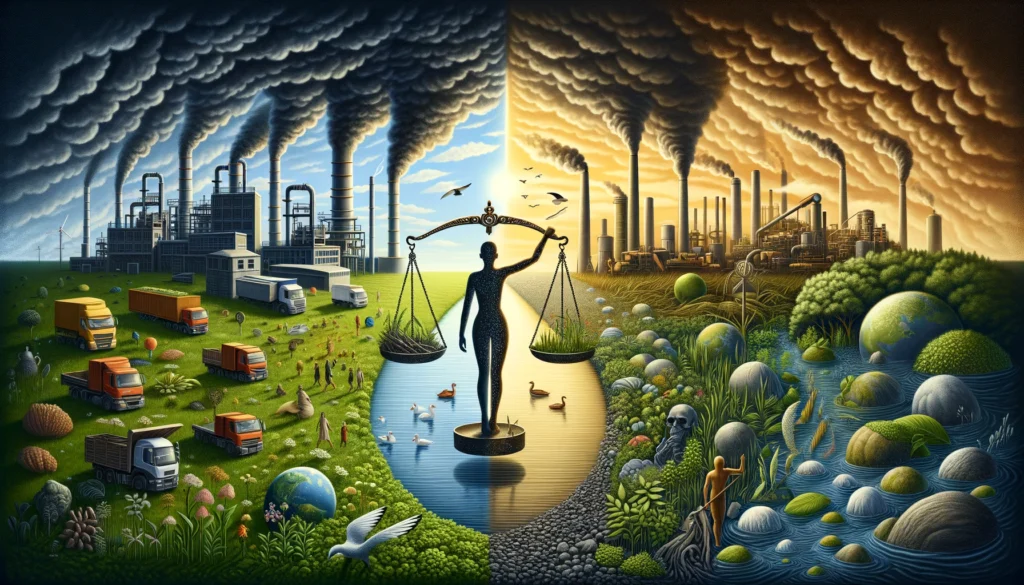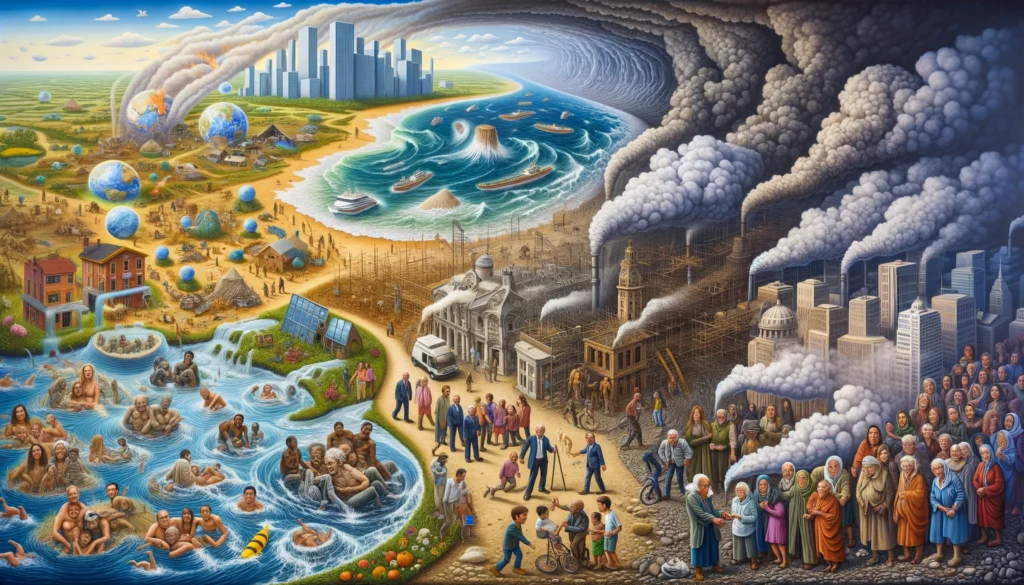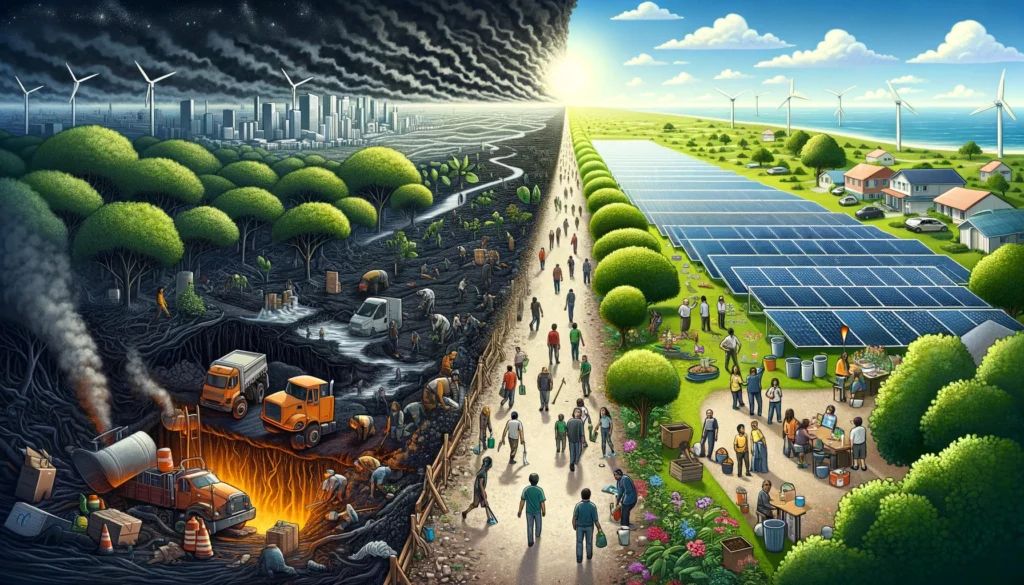Part VI: “Navigating Climate Ethics: Our Shared Responsibility”
Welcome to the sixth part of our blog series, a critical exploration of the ethical dimensions in addressing climate change. This part of our series delves into the moral considerations that underpin our responses to global warming, highlighting the importance of fairness, responsibility, and proactive action in tackling one of the most pressing issues of our time.
Join us as we unravel the complexities of Climate Ethics, examining who is responsible for the causes and solutions of climate change, how we can achieve justice for affected communities, and the ways in which we can safeguard the planet for future generations. Through this journey, we will confront the challenges and discover the paths to ethical climate action, emphasizing the collective effort required to foster a sustainable and equitable world.
The Core of Climate Ethics
At the heart of Climate Ethics lies the question of how we should respond to the challenges posed by climate change, considering the principles of fairness, responsibility, and justice. This ethical framework guides our actions and policies in addressing global warming and its impacts.
- Responsibility and Accountability: Determining who is responsible for causing climate change and who should take action to mitigate it is central to Climate Ethics. Developed nations, having contributed significantly to greenhouse gas emissions, are often viewed as having a greater obligation to lead global efforts in reducing emissions and supporting vulnerable countries.

- Fairness and Equity: Climate Ethics emphasizes the need for fairness in distributing the burdens and benefits of climate actions. This includes ensuring that all countries, particularly those less capable of coping with climate impacts, have access to the necessary resources and technologies for adaptation and mitigation.
- Inter-generational Justice: The concept of inter-generational justice is fundamental to Climate Ethics, focusing on the rights and well-being of future generations. It challenges us to consider the long-term impacts of our current actions on the environment and future inhabitants of the planet, advocating for sustainable practices that preserve the Earth’s ability to support life.
- Ethical Decision-Making: Climate Ethics calls for decisions that reflect ethical considerations, such as minimizing harm, promoting social justice, and preserving ecological integrity. This involves careful deliberation of how climate policies affect different populations, species, and ecosystems, striving for solutions that are just and beneficial for all.
- Global and Local Perspectives: Climate Ethics requires a holistic approach, integrating both global and local perspectives. While the effects of climate change are experienced worldwide, the specific impacts and solutions can vary greatly between regions. Ethical climate action must consider these diverse contexts, promoting strategies that are globally informed yet locally relevant and effective.
Understanding the core of Climate Ethics helps us navigate the complex moral landscape of climate change, encouraging policies and actions that are equitable, just, and sustainable for everyone, now and in the future.
Challenges in Climate Ethics
Navigating the terrain of Climate Ethics brings us face to face with several complex challenges that require thoughtful consideration and action:
- Global Inequality: The unfair reality is that the effects of climate change are not felt equally. Poorer countries and vulnerable communities often bear the brunt of climate impacts, such as extreme weather, rising sea levels, and changing agricultural conditions, despite contributing least to the problem. Addressing this disparity is a major ethical challenge, demanding solutions that provide support without hindering these nations’ ability to develop and prosper.

- Inter-generational Responsibility: The decisions we make today will have long-lasting effects, impacting future generations. How we address climate change now will determine the kind of world they inherit. Ethical climate action requires us to consider not just our immediate needs but also the well-being of those who will come after us, ensuring that our planet remains livable and vibrant for them.
- Economic and Social Trade-offs: Taking action on climate change often involves difficult economic and social decisions. Measures to reduce greenhouse gas emissions can affect jobs, industries, and economies, especially in regions reliant on fossil fuels. Finding a balance between environmental sustainability and economic stability is a key challenge, necessitating policies that are both environmentally effective and socially equitable.
- Political and Corporate Interests: The influence of powerful political and corporate entities can complicate ethical climate action. These groups often have vested interests in maintaining the status quo, especially when it involves profitable but environmentally harmful practices. Overcoming lobbying, political resistance, and short-term profit motives to prioritize long-term climate goals is an ongoing ethical challenge.
- Technological and Resource Limitations: While technology can play a significant role in addressing climate change, there are challenges related to the development, accessibility, and deployment of sustainable technologies. Ensuring that all countries have access to the resources and technologies needed for climate mitigation and adaptation is an ethical consideration that must be addressed in the global response to climate change.
These challenges highlight the intricacies of Climate Ethics, underscoring the need for global cooperation, equitable policies, and a commitment to sustainable and just practices that consider the welfare of all people and future generations.
Paths to Ethical Climate Action
Taking ethical action against climate change means making decisions and taking steps that are fair and responsible, ensuring a sustainable future for everyone. Here’s how we can move forward with ethical climate action:
- Mitigation Efforts: This involves reducing the amount of greenhouse gases we release into the atmosphere. It can be done through using cleaner energy sources like wind or solar power, increasing energy efficiency in homes and businesses, and reducing waste. Mitigation is about lessening our impact on the climate to prevent further global warming.

- Adaptation Strategies: As the climate changes, communities need to adapt to new realities like rising sea levels, more extreme weather, and changing agricultural conditions. Adaptation includes building stronger flood defenses, creating water conservation practices, and developing crops that can withstand different climate conditions. It’s about making sure people can live safely and sustainably, even as the environment changes.
- International Cooperation: Climate change is a global issue that requires countries to work together. This means sharing knowledge, technology, and resources to help all nations, especially those most affected by climate change, to take effective action. International agreements like the Paris Agreement are part of this effort, aiming to unite countries in reducing emissions and supporting each other in adaptation.
- Educating and Mobilizing the Public: Everyone has a role in fighting climate change. People need to be informed about the causes and effects of global warming and how they can help. Education, community initiatives, and public engagement are crucial for building a society that values and takes action for the climate.
- Sustainable Development and Investment: Investing in sustainable development means supporting projects and businesses that contribute to a healthy environment without sacrificing the ability to meet future needs. This includes clean energy projects, sustainable agriculture, and green technology. Ethical climate action involves ensuring that economic growth and development do not come at the expense of the planet.
By following these paths, we can take ethical climate action that protects the environment, supports equitable development, and creates a resilient and sustainable future for all.
Author’s Note
Thank you for joining us in understanding Climate Ethics. As we navigate these challenging issues, remember that our actions and decisions contribute to a larger global effort. By acting ethically and responsibly, we can help ensure a fairer, more sustainable world for current and future generations.
G.C., Ecosociosphere contributor.
References and Further Reading
- “The Ethics of Climate Change” by James Garvey – A clear exploration of the ethical dimensions of global warming.
- “Climate Justice: Hope, Resilience, and the Fight for a Sustainable Future” by Mary Robinson – A book that emphasizes the human rights perspective in climate change discussions.
- “This Changes Everything: Capitalism vs. The Climate” by Naomi Klein – Discusses how economic systems and climate change are interconnected, calling for ethical and sustainable solutions.





Comments
I don’t think the title of your article matches the content lol. Just kidding, mainly because I had some doubts after reading the article.
I don’t think the title of your article matches the content lol. Just kidding, mainly because I had some doubts after reading the article.
Your point of view caught my eye and was very interesting. Thanks. I have a question for you. https://accounts.binance.com/si-LK/register?ref=V2H9AFPY
I don’t think the title of your article matches the content lol. Just kidding, mainly because I had some doubts after reading the article.
I don’t think the title of your article matches the content lol. Just kidding, mainly because I had some doubts after reading the article.